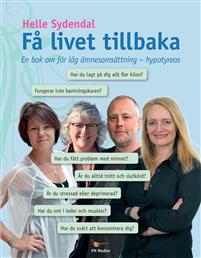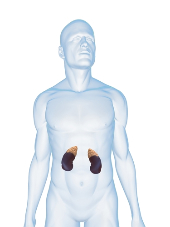Den brittiska läkaren Gordon Bruce Skinner har inte gjort något fel då han behandlat patienter med hypotyreossymtom med sköldkörtelhormon, trots att de inte haft avvikande blodprover, eller då han gett patienter NDT istället för syntetiskt levotyroxin. Det fastslår brittiska General Medical Council, GMC (motsvarande svenska Socialstyrelsen) som ger dr Skinner rätt att fortsätta behandla på sitt vis.
Hjälp gärna till att sprida denna text!
PRESS RELEASE
Issued: 26th November 2011
SALVATION FOR THYROID PATIENTS – DOCTOR EXONERATED BY GMC
Closing the Hearing, The Chairman of the Panel for the General Medical Council (GMC) stated:
”Dr Skinner is now free to practise without restriction within the United Kingdom.”
The GMC confirmed that his diagnostic and treatment protocol for those with symptoms of hypothyroidism is safe, practical and legitimate, and conceded that there are valid alternatives to levothyroxine-only therapy and that blood test results alone should no longer dictate how doctors diagnose and treat this illness.
Tens of thousands of sufferers with symptoms of undiagnosed hypothyroidism in the UK may, at last, get a diagnosis and effective treatment, thanks to 69 year old Dr Gordon Bruce Skinner who practises as a private doctor in Moseley, Birmingham. After a long 7 year battle to clear his name, he was exonerated by the GMC on Thursday 17th November 2011.
Thyroid Patient Advocacy (TPA) (2700 members) speaks on behalf of the hundreds of Dr Skinner’s patients who want to thank the Panel of the GMC for stating their confidence in Dr Skinner. Also, for their wisdom, insight and judgement in finally recognising Dr Skinner’s exemplary record for bringing his patients back to good health.
The Panel felt confident that patient safety had not been disregarded by him and that on the contrary, he had shown a good awareness of the risks of his prescribing and had always communicated these to his patients. The Panel was impressed with the reflection he had shown and his evident immersion in his specialty, and has noted his ready awareness and consideration of views opposing his own, in this field. The Panel was confident that Dr Skinner would continue this reflection in his future clinical work.
At this hearing more than 2000 testimonials for Dr Skinner, most from grateful patients but also from GPs, Endocrinologists and other professionals, were presented. The Chairman was moved by this and by the level of support for Dr Skinner in the Public Gallery which was full on most days. Many of these patients had travelled long distances and stayed in hotels at their own expense, to demonstrate their gratitude to this well-loved doctor, for restoring them to full health after being failed by mainstream medical practice.
The Panel therefore determined that the conditions previously imposed on Dr Skinner’s fitness to practise are revoked forthwith and he is now free to practice without restriction within the United Kingdom.
For more information, please contact Sheila Turner (Chair), Thyroid Patient Advocacy, Squirrel Cottage, Ickornshaw, Cowling, Nr Keighley, BD22 0DH, North Yorkshire. Tele: 01535 636 014. Mobile: 07511942536 – sheilaturner@tpa-uk.org.uk – Website www.tpa-uk.org.uk
BACKGROUND INFORMATION:
There has been dismay for a number of years about the failure to recognise hypothyroid symptoms given the modern techniques at Practitioners’ disposal. As far back as 2003 Dr. Anthony Toft (ex president of the British Thyroid Association) and Dr. Geoffrey Beckett stated:
”It is extraordinary that more than 100 years since the first description of the treatment of hypothyroidism and the current availability of refined diagnostic tests, debate is continuing about its diagnosis and management”. Toft A, Beckett G, BMJ 2003 (8 Feb); 326:295-296
The Panel reviewed Dr Skinner’s case after conditions were placed on his practice in 2007. The allegations against him related to his treatment of 4 patients with thyroid conditions and said that his “rigid approach” had put patients at risk of harm. The main conditions placed on his practice were:
– He could only accept new patients referred by a fully registered medical practitioner.
– Every 6 months he should also provide to the GMC anonymised copies of referral letters, copies of letters sent to GP’s or referring medical practitioners, and copies of letters to the patients and their GP’s prior to initiating or varying any treatment regime when suggesting diagnosis and a care plan.
A Fitness to Practise Panel convened in July 2011 was adjourned for a further 3 months owing to difficulties regarding the GMC’s Expert Witness who was found to be biased against Dr Skinner. It was also found at that Hearing that none of the documentation submitted to the GMC, from GP’s, letters sent to GP’s, the log books, or copies of suggested diagnosis and care plans had been examined.
At the Hearing starting 14 November 2011, the Panel heard from expert witness, Dr Thomas Akintewe and considered his review of the treatment of the 662 new patients referred to Dr Skinner since the date of the first hearing. His report conceded that Dr Skinner had complied with conditions 5, 6 and 7 on his registration. Dr Akintewe stated that there were no formal guidelines to assist in ascertaining thyroid deficiency in the UK, but there was a range for TSH blood tests within the UK to which practitioners were expected to adhere before instituting treatment. This range is broader than that used by Dr Skinner, who chooses to use the better researched US and European guidelines. In these countries, the recommended TSH reference interval is much narrower. The Department of Health have stated that doctors are allowed to use whatever guideline/guidance they wish, including those from other countries, so long as a doctor can give good cause as to why s/he chose to follow that guideline.
When the Chairman to the Panel asked Dr Akintewe “If a patient presented to you with many of the symptoms and signs of hypothyroidism, yet their TSH was within the reference interval, would you give a trial of thyroxine?” Dr Akintewe said “No, I would definitely not do so and neither would other doctors, for fear of litigation”. He continued telling the Panel that only TSH testing is allowed, because serum free T4 and free T3 tests are too expensive.
The GMC Barrister conceded that Dr Skinner had complied with all the conditions imposed by the previous Panel and that he had caused no harm to patients.
The Panel considered that:
1. Dr Skinner’s Fitness to Practise was not impaired and that his approach to treatment, whereby both clinical and biochemical parameters are assessed, fell within the guidelines of ‘Good Medical Practice’.
– The central issue in this case was the propriety of prescribing thyroxine to patients who had symptoms and/or signs of hypothyroidism, but whose blood test results fell within a conventionally accepted reference range, which was generally interpreted as implying “normality”.
– They were satisfied that the procedures Dr Skinner has in place for monitoring his patients were adequate.
– In reference to his prescribing of the unlicensed drug Armour Thyroid, they were content with his reasoning behind its prescription.
The Panel having considered all the evidence agreed that:
1. Dr Skinner had complied with the conditions on his registration for the three years since the first hearing.
2. There was no evidence of patient harm.
3. There was no evidence of any misconduct or deficient professional performance.
4. Dr Skinner had referred them to many papers that addressed the issue of biochemical testing for thyroid disease, and its relationship with the clinical findings.
5. The issue was a complex one.
6. They were satisfied that Dr Skinner’s ability to produce these references had demonstrated both insight and ability to reflect objectively upon his practice.
Till pressmeddelandet på tpa-uk.org.uk
Läs mer i ärendet







